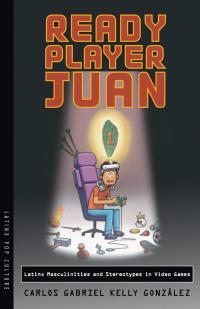Ready Player Juan: Carlos Kelly González explores Latinidad in video games


Dr. Carlos Gabriel Kelly González has always been passionate about video games. He just never expected to be able to study them for a living, not until he joined the English department’s PhD program. Visiting the Digital Media Project’s video game lab with a fellow graduate student turned into a career sparking interest for him. He graduated from Ohio State with a PhD in Latinx studies and video games with a graduate minor in women’s, gender and sexuality studies.
A lifelong gamer, Kelly González has been playing Nintendo games with his sisters since the 80s. Despite that, he says, “I never saw myself in a video game until 2018 or 2019 when I bought this game called Guacamelee! 2. It’s a luchador game. And a Mexican man is the hero, which is wild.” Upon finding out that the Mexican creator of the game moved to Canada to work on it as there were no opportunities in the United States, Kelly González realized “there’s something here” worth exploring.
Kelly González had always thought that video games were the most immersive digital spaces, but initially assumed that he was simply biased as an avid gamer. Chalking his love up to his Leo stubbornness for the longest time, his research made him realize that video games truly do allow players to lose themselves in a digital world. “They are the most immersive because of how we see ourselves when we play games, how we embody the characters, and how some of those experiences stay with us even outside the game.”
The lack of Latinx representation in video games prompted Kelly González to approach his research from a personal perspective. Growing up in the borderlands of San Diego and Tijuana, he started toying around with how “to create theories or ways of seeing that all players and developers can use when they think about video games, write video games, play video games.”
Eventually Kelly González started making the argument that video games themselves are a kind of border crossing. He says, “Video games are borders themselves. They obviously function differently than what's on the line in the sand, but they have the movement of millions of dollars in products all online, digitally.” He continues explaining, “We cross into games by turning on the console, learn new narratives, learn new stories by being that character. So, we cross into something that's bigger than ourselves…a fusion between the character we play, and us the player.”

Kelly González’s thesis research explores the designed identity of Latinx masculinities in video games and operates at the intersection of performance theory, border studies and lived experience. The research culminated in his forthcoming book, Ready Player Juan: Latinx Masculinities and Stereotypes in Video Games.
Kelly González was inspired to explore the concept of designed identity by Shira Chess and her work, Ready Player Two: Women Gamers and Designed Identity. He explains, “She talks about how video game developers don't see women as real people...They try and capture that experience without ever talking to women or thinking about women... basically without consulting women about how they might play, or how they might appear in games.”
Chess’ framework developed Kelly González’s sense of Latinx representation in games. “The larger umbrella of Latinidad [communities] are seen through this prism of criminality, through disease, through taking your resources, all these negatives that are ascribed to Latinos, especially Mexicans, for over 100 years.” He sees a similar lack of representation in the construction of these identities in these interactive digital spaces. The problem with this lack of effort put into representation is that Latine are the biggest ethnic groups that play video games. Kelly González finds, “we don't see any of that reciprocated in our representations. They don't try at all. So, they just design it according to what they already know, which is stereotypes.”
Kelly González’s work shines a light on the importance of people of color being involved in STEM fields to create more diverse environments that consider the varying needs of different groups of people. He has had personal experience with being made to feel like people of color do not have any space to make meaningful contributions in STEM disciplines. Initially planning on being a medical doctor, he says, “I didn’t see anybody that looked like me.” He is glad to have made the switch to English, but he wonders about the possibilities that would have been open to him if he had a mentor.
While Kelly González prizes the role of peer mentorship — he was introduced to his current research interest by a fellow graduate student, Nathan Richards — he finds “you need someone who’s been there and done that” to guide you along the bureaucratic paths of academia. During his time at San Diego State University, he only had one Latino professor. “I had to go to Ohio to get a committee of Latine faculty.” Kelly González personally loves to mentor in his current position and finds it a very important component of making academia a more welcoming space for marginalized communities.
Kelly González’s mentor and thesis advisor during his time with the English department, Frederick Luis Aldama, acted as a deciding factor in Kelly González’s decision to pursue his PhD at Ohio State. Kelly González recalls Aldama’s reassurance as he was considering his options and evaluating his financial choices “It was amazing when Professor Aldama told me, ‘We’re going to get you here, don’t even worry about that. You’re going to be studying here with me.’” Gonzalez continues, “Having someone put your mind at ease like that is really powerful.”
The English department maintains this commitment to help students realize their potential in their desired fields through research topics that are close to their heart. Professors Mintzi Martínez-Rivera and Brad DuBos join us in autumn 2023 and spring 2024, respectively. Martínez-Rivera earned her dual PhD in Anthropology and Folklore from Indiana University-Bloomington in 2014. She will specialize in Latinx Folklore and Literature at the department. DuBos’ teaching will focus on Native American Literature and Culture. The department hopes to facilitate cultural conversations that adds to the intersectional knowledge gained by students.
With the publication of Ready Player Juan, Kelly González also hopes to start a conversation, particularly with the video game industry, about the diversity of their audience bases and the intersectional identities they inhabit. He emphasizes, “Diversity can't just mean you hire diverse coders… we need skills like cultural thinking and critical thinking skills that can be applied in writing rooms where video games are created. The storyline and characters are created. We need input beyond the coders and beyond the male developers and CEOs that run these corporations.”
